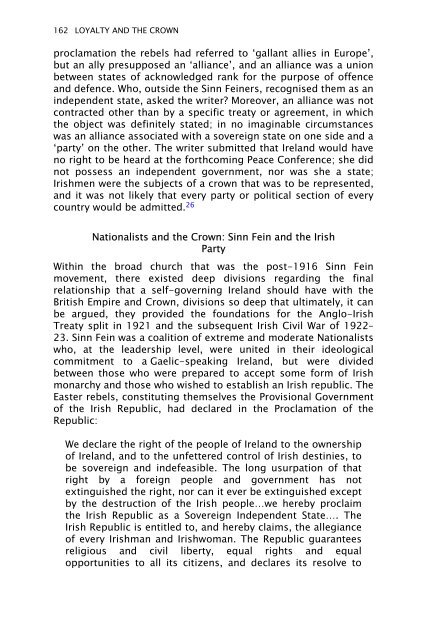Dividing Ireland: World War I and Partition
Dividing Ireland: World War I and Partition
Dividing Ireland: World War I and Partition
Create successful ePaper yourself
Turn your PDF publications into a flip-book with our unique Google optimized e-Paper software.
162 LOYALTY AND THE CROWN<br />
proclamation the rebels had referred to ‘gallant allies in Europe’,<br />
but an ally presupposed an ‘alliance’, <strong>and</strong> an alliance was a union<br />
between states of acknowledged rank for the purpose of offence<br />
<strong>and</strong> defence. Who, outside the Sinn Feiners, recognised them as an<br />
independent state, asked the writer? Moreover, an alliance was not<br />
contracted other than by a specific treaty or agreement, in which<br />
the object was definitely stated; in no imaginable circumstances<br />
was an alliance associated with a sovereign state on one side <strong>and</strong> a<br />
‘party’ on the other. The writer submitted that <strong>Irel<strong>and</strong></strong> would have<br />
no right to be heard at the forthcoming Peace Conference; she did<br />
not possess an independent government, nor was she a state;<br />
Irishmen were the subjects of a crown that was to be represented,<br />
<strong>and</strong> it was not likely that every party or political section of every<br />
country would be admitted. 26<br />
Nationalists <strong>and</strong> the Crown: Sinn Fein <strong>and</strong> the Irish<br />
Party<br />
Within the broad church that was the post-1916 Sinn Fein<br />
movement, there existed deep divisions regarding the final<br />
relationship that a self-governing <strong>Irel<strong>and</strong></strong> should have with the<br />
British Empire <strong>and</strong> Crown, divisions so deep that ultimately, it can<br />
be argued, they provided the foundations for the Anglo-Irish<br />
Treaty split in 1921 <strong>and</strong> the subsequent Irish Civil <strong>War</strong> of 1922–<br />
23. Sinn Fein was a coalition of extreme <strong>and</strong> moderate Nationalists<br />
who, at the leadership level, were united in their ideological<br />
commitment to a Gaelic-speaking <strong>Irel<strong>and</strong></strong>, but were divided<br />
between those who were prepared to accept some form of Irish<br />
monarchy <strong>and</strong> those who wished to establish an Irish republic. The<br />
Easter rebels, constituting themselves the Provisional Government<br />
of the Irish Republic, had declared in the Proclamation of the<br />
Republic:<br />
We declare the right of the people of <strong>Irel<strong>and</strong></strong> to the ownership<br />
of <strong>Irel<strong>and</strong></strong>, <strong>and</strong> to the unfettered control of Irish destinies, to<br />
be sovereign <strong>and</strong> indefeasible. The long usurpation of that<br />
right by a foreign people <strong>and</strong> government has not<br />
extinguished the right, nor can it ever be extinguished except<br />
by the destruction of the Irish people…we hereby proclaim<br />
the Irish Republic as a Sovereign Independent State…. The<br />
Irish Republic is entitled to, <strong>and</strong> hereby claims, the allegiance<br />
of every Irishman <strong>and</strong> Irishwoman. The Republic guarantees<br />
religious <strong>and</strong> civil liberty, equal rights <strong>and</strong> equal<br />
opportunities to all its citizens, <strong>and</strong> declares its resolve to








